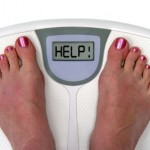I saw an interesting New York Times article on the 26th and kept it on my Kindle. It mentioned an article which just was published in The New England Journal of Medicine on why people who succeed in losing weight often find it difficult to not regain the pounds they've lost. Prior studies have speculated that a dieter's metabolism changes with altered hormone levels bringing about increases in appetite.
I just looked at the short form of the NEJM article online; I don't subscribe to that publication anymore and will have to get the whole article at the local hospital's medical library. It's a small but significant study, done by researchers in Melbourne, Australia utilizing fifty overweight or obese patients on an extreme ten-week diet, measuring levels of a number of hormones involved in appetite both at the end of the diet period and one year later.
The goal was to have the subjects lose ten percent of their body weight. Then they were to go on a maintenance diet to keep the weight off. Only thirty-four finished the diet period with the goal weight loss, some quit the study and others lost less than 10%.
So it's really a very small group, thirty-four successful dieters, who were followed for an additional year. They started at an average of 209 pounds, ate only 500 to 550 calories a day for the initial ten-week study period and lost an average of 29 pounds (14%) of their initial weight. A year later the average patient had gained back half what they had lost and the hormone measurements, especially of leptin, ghrelin and peptide YY, all involved in appetite one way or the other, were still not totally back to normal.
Maybe that's the reason so many people gain weight back after dieting. This may not have been a large-scale study, but it speaks volumes.
The Los Angles Times commended on the article and on dieting in general. They noted that four out of five initially successful dieters regain their weight, sometimes more than they lost by dieting. Of course most of them hadn't gone on such a stringent diet. It makes much more sense to me to lose weight gradually, a pound or so a week is a reasonable goal.
I did that back in early 2009, losing ~30 pounds, and this morning I was still 27 pounds down. I also decided to make exercise a must in my busy schedule and go to the gym six days a week on the average. I can burn ~550 calories on the recumbent bike before I do stretches and work on a few machines. I also walk our new dog twice a day for 20-30 minutes.
Many people say they can't find that much time in their day and yet they find time for TV or movies or their email.
I think it's time to change priorities; take some of the time you spend sitting and walk or exercise instead. Gradual weight loss combined with an increase in calories burned makes much more sense than going on 500-calorie diets. I'd like to see measurements of those same hormones in a group who try this approach.
Otherwise you're just paraphrasing Admiral David Farragut at the 1864 Battle of Mobile Bay, "Damn those hormone levels; full speed ahead."
Tags: Dieting, Hormones affecting appetite, severe calorie restriction


